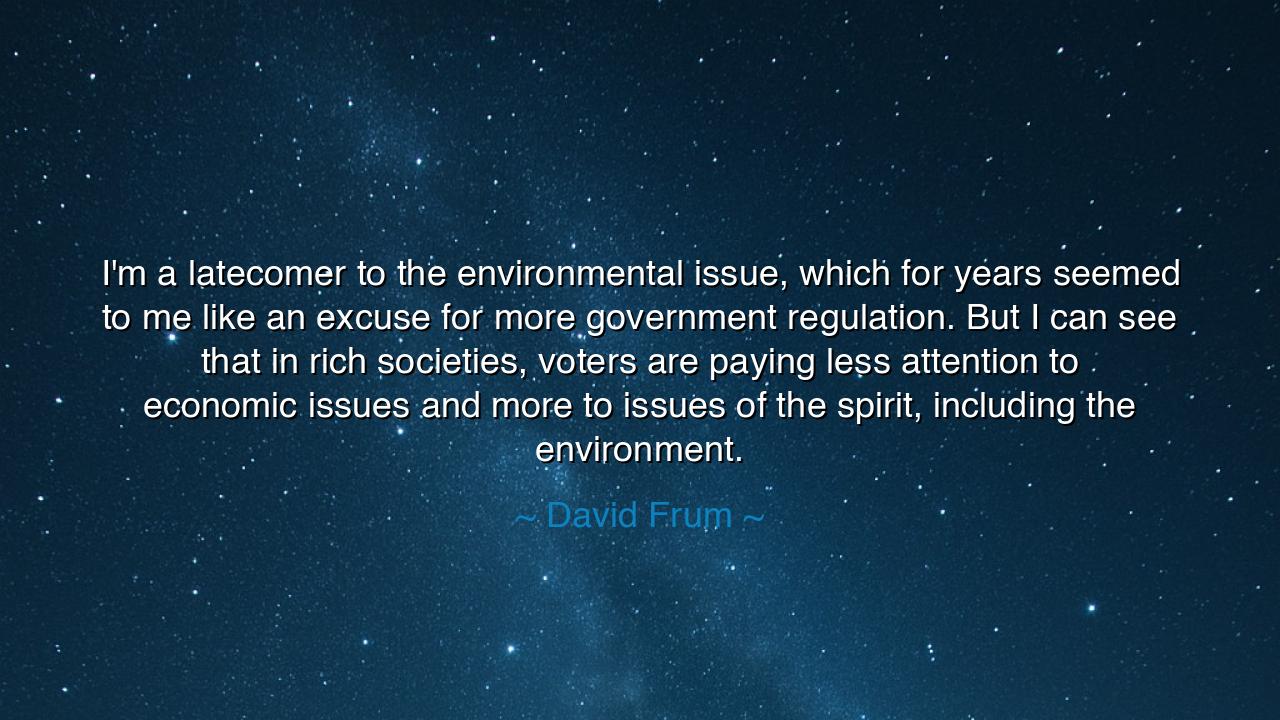
I'm a latecomer to the environmental issue, which for years
I'm a latecomer to the environmental issue, which for years seemed to me like an excuse for more government regulation. But I can see that in rich societies, voters are paying less attention to economic issues and more to issues of the spirit, including the environment.






The words of David Frum, “I’m a latecomer to the environmental issue, which for years seemed to me like an excuse for more government regulation. But I can see that in rich societies, voters are paying less attention to economic issues and more to issues of the spirit, including the environment,” are the confession of one who has passed from doubt into awakening. They reveal the journey of a mind once hardened by suspicion, who saw environmental concern not as a noble cause but as a tool for political control. Yet with time, he discerned a deeper truth—that in societies where wealth has secured material comfort, the heart of the people turns toward higher callings, toward matters of meaning, beauty, and the survival of the earth itself.
The origin of this saying lies in Frum’s own career as a political thinker and writer, one often skeptical of regulation and government expansion. To him, for many years, environmentalism was cloaked in the garments of bureaucracy and control. But as the decades passed and the evidence of environmental decline mounted—polluted skies, melting glaciers, dying forests—he began to see the issue not as an invention of regulators but as a genuine matter of human spirit. It was not only about policy; it was about the longing of people to live in harmony with the world that nourishes them.
History has seen this transformation before. Consider the citizens of Athens during the Golden Age. Once consumed with survival and war, they turned, in their prosperity, to the building of temples, the pursuit of philosophy, and the cultivation of beauty. Material safety allowed them to rise toward the higher matters of the soul. So too in the modern age, as Frum observed, do the rich societies turn their eyes from the struggles of bare survival to the question of how to preserve the grandeur of the earth. The environment, once dismissed as luxury, becomes recognized as necessity—a necessity not only for survival but for the nourishment of the spirit.
The deeper meaning of Frum’s words is this: the environment is not simply about laws and limits. It is about the soul of a people. To protect the land, the air, and the waters is to affirm that life is more than money and profit, that civilization must seek not only to grow but to endure in dignity. When the basic needs of food and shelter are met, the conscience of a nation awakens to greater responsibilities—to justice, to beauty, to truth, and to stewardship of creation. This is the progression of a society that aspires to wisdom rather than mere wealth.
Yet there is also humility in his statement. He admits to being a latecomer, and in this he speaks for many. Often it takes time for human beings to see beyond their own narrow interests. Often it takes crisis for the eyes to open. But better late than never, for the path to truth remains open to all who will walk it. His words remind us that awakening to environmental responsibility is not the mark of weakness or naïveté, but of maturity—the recognition that human destiny cannot be separated from the fate of the earth.
The lesson for us is clear: let us not wait until comfort blinds us or crisis forces us. Let us embrace issues of the spirit now, while there is still time to protect what remains. Engage not only in debates about profit and regulation, but in reflection upon what kind of world we wish to leave behind. Act not merely for your own gain, but for the rivers, forests, and skies that sustain generations yet unborn. In this lies the nobility of our time: that we rise above survival to embrace stewardship.
Therefore, let us live with courage and clarity. Support policies that preserve the earth not as a cage of regulation, but as a covenant of care. Teach your children that prosperity is meaningless if the land itself is dying. Seek always the balance between material wealth and spiritual responsibility. For in the end, it is not the abundance of gold but the abundance of life that makes a society truly rich.
So let Frum’s words endure as a testament to change: “Voters are paying less attention to economic issues and more to issues of the spirit, including the environment.” This is the path of wisdom for all peoples. Let us follow it boldly, so that in the fullness of time, we may be remembered not for our consumption, but for our guardianship of the living earth.






AAdministratorAdministrator
Welcome, honored guests. Please leave a comment, we will respond soon